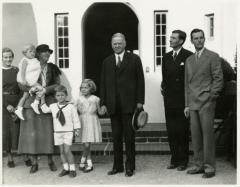
Herbert Hoover’s life was shaped by the Quaker values he first learned in Iowa. Photo courtesy of the Herbert Hoover Presidential Library-Museum
By Glen Jeansonne and David Luhrssen
From the time of his birth in West Branch, until he left the care of his Uncle John Minthorn in Oregon to attend Stanford University, Herbert Hoover was reared in a Quaker environment. His adult personality and his career in business, philanthropy and politics was shaped by the values he absorbed as a child. West Branch was a small town on the cusp of the American frontier, a village of 400 in his boyhood. Frontier life only reinforced the Quaker values of independence, self-reliance and individualism.
Quakerism was a way of life and a state of mind. Their services were silent until someone moved by the emotion of their “Inner Light” felt led to speak. Services at the West Branch Society of Friends’ meetinghouse where the Hoovers worshipped on Sunday lasted about two hours, with long periods of silent meditation.
Quakers were known for practicing what they preached: humility, charity, equality and treatment of all men as brothers. They were principled, even stubborn, yet also tolerant. They opposed slavery and racism. In America, they paid American Indians for their land rather than seizing it. Quakers were also known for being serious, thrifty, industrious and individualistic. Most were scrupulously honest.
Hoover’s approach to caring for the needy was rooted in his upbringing. Quakers cared for their own as well as outsiders in times of crisis, however, generosity was reserved for those who truly needed it. Once they could stand on their own, the recipients of charity were expected to carry their share of work. Quakers preferred simplicity and did not consider worldly wealth important, yet because they were hard-working and spent little they often accumulated significant sums.
TO READ MORE ABOUT THIS STORY AND OTHER FASCINATING STORIES ABOUT IOWA HISTORY, subscribe to Iowa History Journal. You can also purchase back issues at the store.
